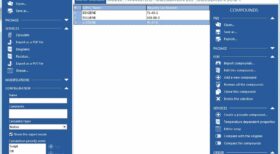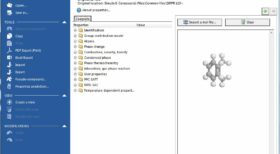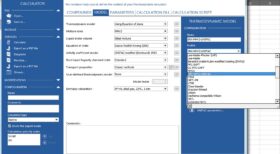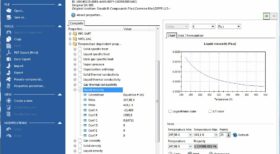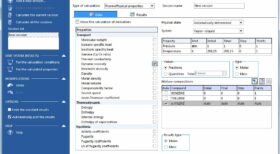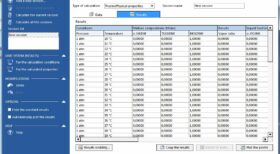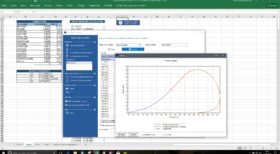Simulis Thermodynamics with DIPPR L23+
Mixture properties and fluid phase equilibria calculations
The software component for mixture properties and fluid phase equilibrium calculations with the DIPPR L23+ database.
Simulis Thermodynamics is a calculation server for thermophysical properties and phase equilibria calculations on pure components and mixtures.
DIPPR L23+ is the main reference for the thermophysical properties of pure components and contains the updated and controlled properties of numerous components, including all industrially relevant components.
Main features
Reliable and accurate thermophysical properties
One of the richest thermodynamic database available on the market
Extensive set of services (flash, data regression, phase envelopes, etc.)
Powerful pure-compound physical properties prediction tool
Automatic splitting of user added molecules into appropriate functional groups for the predictive models (various UNIFAC, PSRK …)
Easy plug in common 32- and 64-bit applications (Microsoft Excel®, MATLAB®, etc.)
Flexible and CAPE-OPEN compliant solution
Buy online : Simulis Thermodynamics with DIPPR L23+
Simulis Thermodynamics is a calculation server for thermophysical properties and phase equilibria calculations on pure components and mixtures.
It is available as a Microsoft Excel® add-in, a toolbox in MATLAB® or as a software component which can be easily plugged in any other application requiring reliable and accurate thermophysical properties.
Objectives:
Simulis Thermodynamics provides engineers and software developers with an accurate and reliable thermophysical properties calculation server. These calculations can be integrated in any package intended for wider fields of application (equipment sizing, system modeling, etc) in order to ensure the consistency and reliability the data used and of the results.
Simulis Thermodynamics is designed to:
- Provide access to over 300 functions, in particular for calculation of any type of transport properties (specific heat, viscosity,…), of thermodynamic properties (enthalpy, compressibility factor …) or of phase equilibria (VLE, LLE, VLLE, salt formation …) on multi component mixtures
- Provide access to one of the richest thermodynamic models libraries available on the market (equation of state, activity coefficients …)
- Provide access to a property database of more than 2300 pure components
- Enable the engineer to focus on their application and to work with thermophysical properties calculations that are reliable, and validated through intensive usage in industrial applications
In support of your thermodynamic expertise, Simulis Thermodynamics will enable you to:
- Use the best thermodynamic representation of your system.
- Perpetuate your expertise with easily created “Property Packages” that include all elements needed for further calculations (pure components properties, models, interaction coefficients …)
- Distribute these “Property Packages” throughout your organization in order for them to be used in your usual, CAPE-OPEN compliant, software.
Simulis Thermodynamics is available in French, English and Russian.
DIPPR L23+
This database is the main reference for the thermophysical properties of pure components and contains the updated and controlled properties of numerous components, including all industrially relevant components. The properties covered include data for 29 fixed-value properties (molar weight, critical temperature, critical pressure, etc.) and correlation coefficients for 15 temperature-dependent properties (liquid and vapor heat capacity, vapor pressure, liquid and vapor viscosity, …).
ProSim’s DIPPR L23+ is an enriched version of the DIPPR® database. It provides reliable and up-to-date information for more than 2300 compounds. The information added by ProSim’s experts comes from in depth research projects and studies.
DIPPR L23+ is available as an option in most ProSim software packages, particularly ProSimPlus, Simulis Thermodynamics and ProPhyPlus. This option completes the thermodynamic package of ProSim, already considered one of the richest and most reliable.
Simulis Thermodynamics with DIPPR L23+ is available to buy online.
The price includes a valid license for the chosen duration, from the purchase date. The price also includes a free 10-days license of ProPhyPlus.
MUTS services (Maintenance, Update, Training and Support) are provided during the duration of the contract.
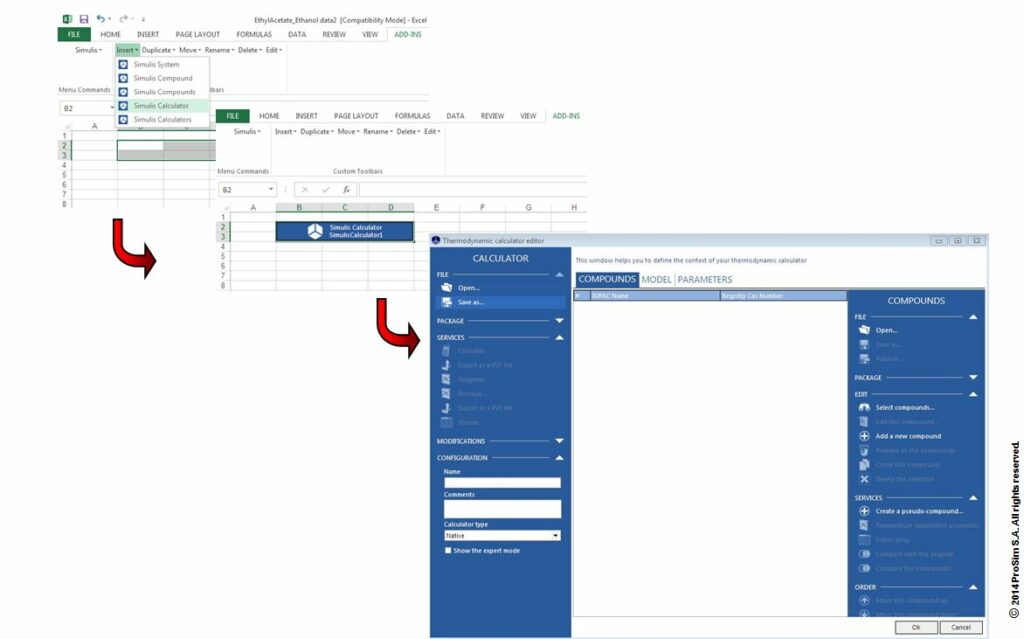
Access rigorous thermodynamic in Excel with Simulis Thermodynamics
Hardware requirements
Intel (or equivalent) based PC with:
- 2 GB RAM or more (4 GB recommended).
- 32-bit or 64-bit operating system such as Microsoft Windows XP, Vista, Windows 7, Windows 8, Windows 10, Windows Server 2003, Windows Server 2008, Windows Server 2012, Windows Server 2016, Windows Server 2019 (please consult for other systems).
- At least 2 GB free disk space after install for optimal desktop performance.
- Microsoft Excel™ 32 bits or 64 bits.
- Internet access to download the software and the license.
Robust and validated calculation functions
- Simulis Thermodynamics, allows the engineer to calculate properties and phase equilibrium on single component systems or systems that include up to 2300 chemical components.
- Thermodynamic property calculations: transport properties, enthalpy, entropy, compressibility properties, non-ideal properties…
- Phase equilibria calculations: vapor-liquid, liquid-liquid, vapor-liquid-liquid (bubble and dew temperatures, bubble and dew pressures, isentropic flash…), vapor-liquid-solid.
- Regression calculations: functions for the fitting of experimental pure component properties, depending on temperature
- An extensive thermodynamic models library: Soave-Redlich-Kwong, Peng-Robinson, Lee-Kesler-Plöcker, NRTL, UNIFAC etc… These models were selected for their reliability and efficiency
- A powerful pure-compound physical properties prediction tool for molecules which are not in the database or with poor measured properties;
- An automatic splitting of user added molecules into appropriate functional groups for the predictive models (various UNIFAC, PSRK …);
- Exergy calculation: exergy, also known as “available energy” or “useful energy”, is a valuable indicator when one is interested in reducing the energy consumption of processes. Functions make it possible to calculate the exergy of a stream and to quantify its chemical and physical components.
One of the largest thermodynamic library available on the market
A database of more than 2300 components: developed from the DIPPR database and enriched with data from research projects and studies conducted by ProSim’s thermodynamic experts. Furthermore, the latest release of AIChE’s DIPPR® database can be added (optional).
Easy integration in common applications
Integration and flexibility: the ability to integrate your own “proprietary” component databases or thermodynamic models.
A full set of services available
• Graphical display of properties on temperature, pressure or composition ranges
• Generation of property tables
• Data regression of experimental properties
• Estimation of pure component properties
• Plot of phase envelope diagrams
• Calculation of residue curves and plot of ternary diagrams
• Calculation of petroleum fractions properties
• Unit conversion, etc…
A flexible and CAPE-OPEN compliant solution.
Other components provided with Simulis Thermodynamics
Simulis Conversions: physical units conversion management tool. This component can be plugged in any application that manipulates physical dimension in order to easily manage associated units.
Simulis Properties: pure substances intrinsic properties (constant or temperature dependant) engine. This component can be plugged in any application that only needs to calculate pure substances properties.
- Interface
- Compound details
- Thermodynamic model selection
- Compound editor
- Calculation services
- Calculations services – results
- Phase envelope
Watch the recorded webinar: How to easily access thermophysical properties and rigorous thermodynamics in Excel ?







